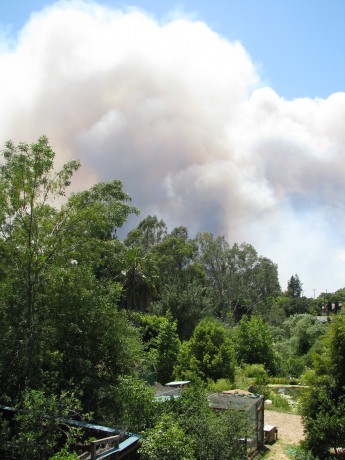- Building and Landscaping, Compost, Fungus and Mushrooms, Gardening adventures, Heirloom Plants, Hugelkultur, Natives, Permaculture and Edible Forest Gardening Adventures, Rain Catching, Seeds, Soil, Water Saving
The Albedo Effect: How Bare Earth Causes Wild Weather

This week’s 100F+ temperatures and high Santa Ana winds have fueled three fires close to us. It is May, not October. Albedo is a reflection coefficient. In layman’s terms it is the effect that happens when sunlight is reflected off of white areas. There is the high albedo of bare earth, snow and ice, and clouds, and the low albedo of water and vegetation. There is less reflection from dark areas such as off of water and green areas, and darker areas, just like dark clothing, absorbs more heat rather than reflects it like white clothing does. There are arguments that we should cut down all the trees to increase white space to stop global warming. NO! The plant life that occupies the green spaces transpire water and excess heat into the air, causing cloud cover. Clouds, of course, insulate the earth from the sun and their albedo effect is cooling to the earth, not to mention that clouds amass moisture and – bingo – you get rain. It is the loss of green areas and the desertification of large masses of Africa, and the in-progress desertification of the already drier areas of the world (such as California) that makes the albedo effect one that is helping warm our climate. Great tracks of land now reflect light into cloudless skies; water sources dry up and plants die so transpiration disappears. The loss of air-borne water (evapotranspiration) allows areas around the desert area to also dry out. The rapid change of climate due to desertification, loss of topsoil and the resulting erosion and the melting of our ice caps (creating larger oceans and thus larger thermal masses to reflect heat) causes severe weather patterns – weather patterns that balance out huge dry desert areas with destructive rain and wind storms in other areas. Drying areas ignite… here in San Diego North County there are five fires burning as I sit, and heavy smoke and ash rain down on everything between them. My house is not threatened at this time, but we may be evacuated. So many people are evacuated right now and the highways are packed. There is another fire near San Diego, and two between here and Los Angeles. It is May – usually we have these temperatures, wild winds from the desert called Santa Ana winds, and fire threat in October. Our lack of rain doesn’t bode well for California.
My point is that to help balance nature out again, we need to hurriedly lessen the amount of reflected light in areas where we were traditionally covered by plants. We need to plant. We need to plant native plants. We need to re-green our landscapes, in each backyard and vacant lot, as quickly as we can. Allow the plants to keep moisture in the soil, to slow flooding, to transpire moisture into our atmosphere so that rain comes back to the desert areas. We need to hold what rain that falls in our soil by burying wood (hugelkultur), by creating level swales and mulching, mulching, mulching. Yet on trash day I see bags and bags of leaves set on the street ready to go to the dump. We need to stop erosion areas by using whatever means we can to keep the topsoil back. We need native trees with long roots that will hold the soil, build topsoil and transpirate.
Of course you probably can’t afford lots of plants, so plant natives that will quickly grow large. Between the slower-growing oaks, plant sages, mallows, ceanothus, quail bush and other bushes that cover 10 -15 feet of dry earth. Under them will be moisture, protected soil with mulch from their leaves, and habitat for lizards, frogs, small birds and hundreds of insects. These bushes will help shade young oaks, sycamores, and other trees and keep their trunks from scorching.
Throw down seeds of California fescue (Festuca californica var. parishii) to hold soil and cover the dry, reflective areas. This native grass is tough and doesn’t cause trouble like non-native grasses. You can seed it with California poppies, lupine and other native flowers. Aggressively weed out non-native species.
Since I was little, in the 60’s, I heard the mantra ‘plant a tree’. Obviously we haven’t been doing that. I think it should be changed to ‘plant a tree and don’t cut down any more because the earth can’t afford it’!
Please plant! And all my hope goes to you and yours who are threatened or have had losses from our severe weather.